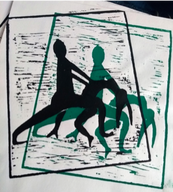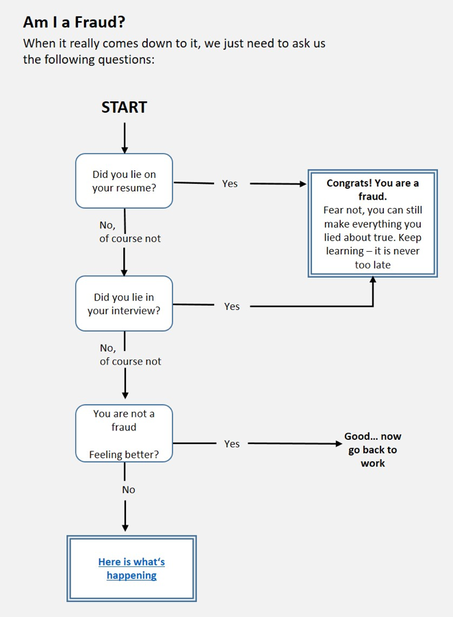“ There must have been a mix-up” “ ...maybe there was another candidate named Julia, and they confused us - it is such a common name” “ ...maybe they had a stack of applications on their desk- then a gust of wind came - threw the stack off the desk- and suddenly the last application was the first - mine” “What happens when they find out?” These are some of the things I heard myself say on the phone, talking about my new position. It took some time until I realized how crazy that sounded. The following is not an article, but a summary of my thoughts. Am I a Fraud Quiz. Should you end up on "Imposter Syndrome" please follow https://www.youtube.com/watch?v=5SCzuinYQ80 for a quick summary. About Imposter Syndrome It is common to feel anxious after a new accomplishment, the completion of a degree, or a new job. Your next step will basically be a promotion and you will have to do things that you have never done before. Feeling inadequate initially is, in my opinion, natural. It is also an opportunity to grow. Meaning, we have to address and overcome those doubts and insecurities, in order to succeed. This ends up being more complicated for some of us than for others. Some have developed a pattern of behavior where they doubt their accomplishments and are constantly scared of being exposed as a “fraud”. It is currently studied as an experience or phenomenon that occurs to certain individuals, not a mental disorder. Imposter syndrome is often accompanied by anxiety, or depression. According to a study in 2011 about 70 percent of people will experience at least one episode in their lives. Risks Ignoring imposter syndrome can damage your health, your personal life and your career. Affected individuals tend to either procrastinate, or over-prepare when having a new assignment, leading to burnouts. Stress can also lead to impaired memory retrieval. The lack of self-esteem can lead to missed opportunities. Families can suffer, when someone prioritizes their career over time with their family, which is quite common for a person suffering from imposter syndrome. Breaking Out: We believe we did not deserve our success - if we become more successful - that proves our point - if we fail - that also proves our point. So, what can we actually do? Structure your thoughts:
Connect: It is natural to look for quiet and peace, when you feel stress and overwhelmed with your situation. We have the tendency to retreat, when we actually need to know that we are not alone. Social interaction is healthy, but the most important person to connect with is yourself.
Build up your confidence:
 Sunset at Linlithgow loch - because you can sup on any body of water. Sunset at Linlithgow loch - because you can sup on any body of water. How I protect my mental health: Sports: I absolutely believe in sports as a way to shift the focus of my self-worth back from others to myself. Nothing can keep me from my hikes, stand up paddling, enjoying nature and trying out new things like bouldering.  Wood block print - An attempt of visualising my love for Tango Wood block print - An attempt of visualising my love for Tango Meetup groups: An online platform to meet groups of people with similar interests. Rostock - my new home - is small so there is a limited number of meetup groups. I recently joined the “draw together” group - and no - I have zero talent, but that is not the point. As pointed out earlier, social interaction is healthy. So, this group is my way of socializing and giving myself a challenge.  Motivational phrases on chalkboard, placed in my flat - also a nice place to doodle. Motivational phrases on chalkboard, placed in my flat - also a nice place to doodle. Motivational statements on chalkboard stickers around my flat. I am basically boosting my confidence every day. Watching the occasional comical, uplifting youtube video. I had a serious Lilly Singh-phase, when I moved to start my PhD.  One of the dogs in our local shelter - pretending to give me the cold shoulder One of the dogs in our local shelter - pretending to give me the cold shoulder I used to volunteer as a rape and abuse support worker. Now I am walking dogs for the local animal shelter. At that point I wholeheartedly confirm that volunteering does give you purpose and puts a lot of things into perspective. In the end imposter syndrome and anxiety are more common than we care to admit. It is an unhealthy way of dealing with coming out of one’s comfort zone. There are a million ways to deal with anxiety of and we all have to find a coping mechanism that works for us. There is no point in letting anxiety paralyze you, or wallowing in self-pity. The previously mentioned methods are not specific for imposter syndrome and can also be helpful for other types of anxiety or depression. You are where you are for a reason - Let yourself grow. P.S.: If none of this works, there is nothing wrong with seeking professional help Resources & Helpful links
Others sharing their stories: https://medium.com/brilliantforge/accepting-5-truths-helped-me-overcome-impostor-syndrome-5b37e85149b https://impress.org/breaking-imposter-syndrome-isolation/ https://www.marieclaire.com/career-advice/a24567262/how-to-overcome-imposter-syndrome/ https://dev.to/helenanders26/how-im-dealing-with-imposter-syndrome-and-stress-4fdm https://puttylike.com/a-bad-case-of-imposter-syndrome/ https://www.fastcompany.com/40421352/the-five-types-of-impostor-syndrome-and-how-to-beat-them Literature: Kuhlmann et al., 2005 Sakulku and Alexander, 2011 Langford and Clance, 1993 Huang, 2013
Colin Murdoch
6/9/2019 10:41:33 am
Thanks Julia, Everyone feels this way at some point - this is a nice analysis of why and some wayts to deal with it.
Reply
Leave a Reply. |
About the blogBeing a PhD student in a European training network is a life-changing adventure. Moving to a new country, carrying out a research project, facing scientific (and cultural) challenges, travelling around Europe and beyond… Those 3 years certainly do bring their part of new - sometimes frightening - but always enriching experiences. Categories
All
Archives
December 2021
|




 RSS Feed
RSS Feed

7/8/2019
1 Comment